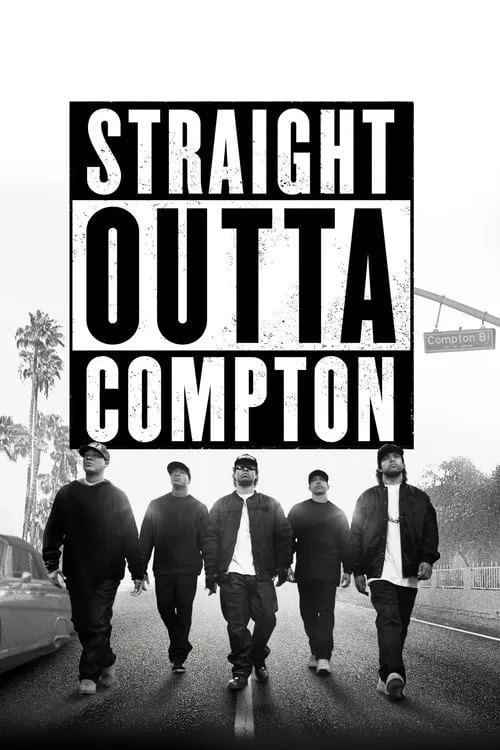Straight Outta Compton

Plot
In the vibrant city of Compton, California, the late 1980s served as a tumultuous backdrop to the lives of Dr. Dre, Eazy-E, Ice Cube, MC Ren, and DJ Yella – five talented individuals who would soon join forces to form the groundbreaking hip-hop group N.W.A. This explosive fusion of music and social commentary would not only catapult them to global fame but also spark a revolution that would resonate for generations to come. The film Straight Outta Compton begins with Dr. Dre, born Andre Young, navigating the complexities of gang life in Compton alongside his friend Eazy-E. The talented rapper's natural flair for rhymes soon caught the attention of Jerry Heller, a charismatic and cunning music industry entrepreneur. Recognizing Eazy's potential, Heller partnered with Eazy to form Ruthless Records, a fledgling label that would eventually become the platform for N.W.A.'s explosive sound. As Dre and Eazy collaborated with fellow rappers Ice Cube, MC Ren, and DJ Yella, a distinctive style began to take shape. N.W.A.'s early concerts at local bars and clubs, including the infamous Club 56, showcased their unbridled energy and raw emotion. Their lyrics tackled issues that the mainstream media was largely unwilling to address – police brutality, racism, poverty, and the perils of gang life in Compton. With their powerful stage presence and raw talent, N.W.A.'s star continued to rise. Their early releases, such as 'Straight Outta Compton' (1988) and '100 Miles and Runnin'' (1990), proved to be game-changers in the hip-hop landscape. The unapologetic truth-telling in these tracks resonated deeply with the streets and earned the group a fierce following among the urban youth. However, the wild success of N.W.A. didn't come without its challenges. Tensions within the group began to simmer as egos clashed and financial disparities mounted. Dre and Eazy's creative visions often conflicted, while Ice Cube found himself increasingly disillusioned with the group's business operations. As their individual strengths and weaknesses began to surface, N.W.A.'s dynamics faced severe testing. Against the backdrop of gang conflicts and police confrontations, a deep respect and camaraderie grew among the group members. Ice Cube's ingenious lyrics captured the anxieties of urban life, while Dre and Eazy traded verses with MC Ren, painting vivid portraits of the harsh realities of gang violence. The chemistry was undeniable; songs like 'Straight Outta Compton' and 'Gangsta Gangsta' cemented the group's status as torchbearers of a new musical genre. N.W.A.'s rising influence soon caught the attention of the then-governor of California, George Deukmejian, who publicly condemned their music as 'sexually explicit and anti-authoritarian.' Such backlash fueled the group's disdain for authority and further galvanized their performances. As their popularity grew, so did the pushback – both from civil authorities and the other side of the hip-hop spectrum. Their confrontational lyrics not only resonated with an unresponsive mainstream but also invited significant public censure. With critics accusing them of inciting gang violence, N.W.A.'s popularity found itself momentarily threatened. Amidst mounting pressure, the label threatened to drop them, only to be met with an uncompromising response: N.W.A. turned against their industry handler Jerry Heller. Straight Outta Compton vividly shows how friction between N.W.A. and the powers that be led to the group's self-destruction. Dre took a backseat from the group and eventually collaborated with Suge Knight to form Death Row Records. Ice Cube continued making solo music, choosing not to rejoin N.W.A. after the conflict. Eazy also pursued a solo career but struggled with addiction, leading to a tragic and untimely death. Despite the inevitable demise of N.W.A., their lasting legacy transformed hip-hop and inspired countless artists to challenge the status quo. With Straight Outta Compton, the true story of music's greatest innovation is now finally exposed – reiterating the power that their music possessed, and, indeed, still possesses.
Reviews
Kiara
Surprisingly decent biopic. They definitely glossed over some of the more controversial aspects, but then I saw Dr. Dre and Ice Cube were producers and it all made sense. I kept thinking the actor playing Cube was incredibly like him – turns out it's his actual son, which is pretty cool. This movie brought back memories of my own "cut-out bin" days, buying their greatest hits.
August
Straight Outta Compton: A cautionary tale of "don't bite the hand that feeds you," primarily understood through a robust vocabulary of "fuck," "shit," and "nigger."
Ariana
Being the only Asian dude at the premiere surrounded by a sea of black media folks with a reserved seat was an experience. I couldn’t help but imagine the headlines if a shooting broke out: "Black Men and Beautiful Women, Plus One Asian Guy." Jokes aside... the movie's a long ride, but almost all the OG rappers make an appearance. The soundtrack was a sing-along anthem for the entire audience. My only gripe? It could've captured the vibe of the late '80s a little better.
Christian
If you grew up on this music like I did, you're gonna cry. If you didn't grow up on this music, you're gonna laugh your ass off. (Seriously, this is straight-up comedy.)
Joseph
Okay, here's an English translation that captures the sentiment and tone of "一般,特么还拍那么长!": "Meh, it was alright... and it's way too damn long!"
Recommendations


